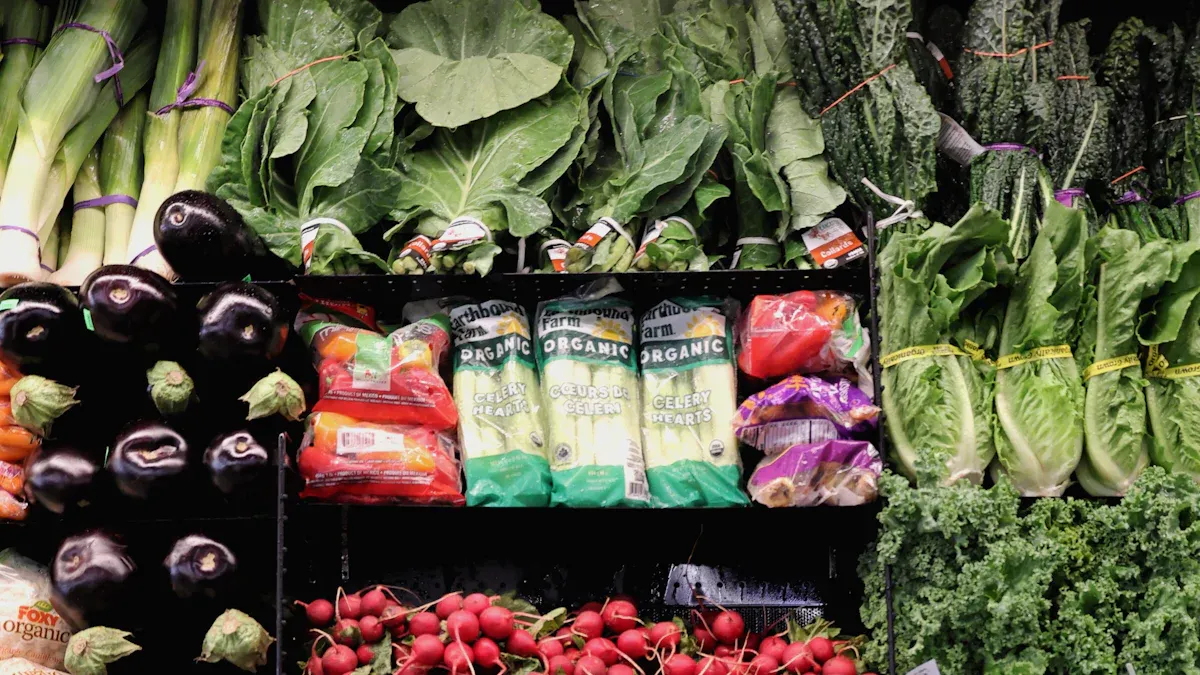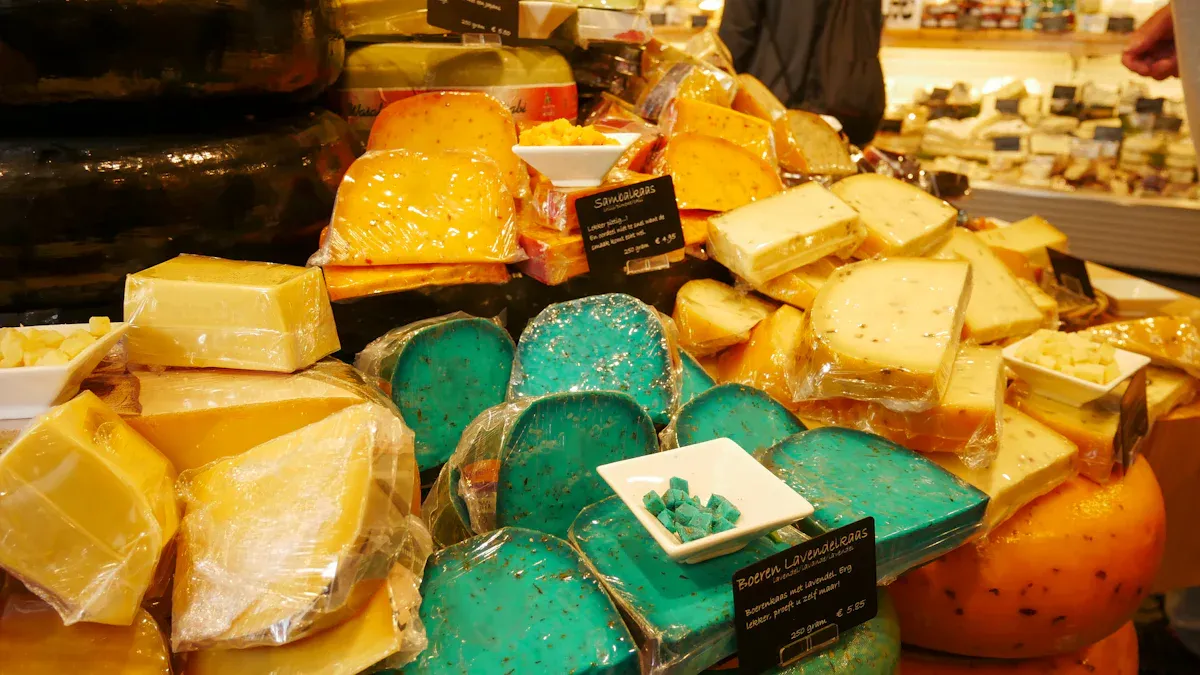- EasyCard
- Trade
- Help
- Announcement
- Academy
- SWIFT Code
- Iban Number
- Referral
- Customer Service
- Blog
- Creator
Analysis of Food Expenses in the Cost of Living in Switzerland and Money-Saving Tips

Image Source: pexels
You may have noticed the high food costs in Switzerland. According to Eurostat, Swiss food prices are 1.6 times the EU average, with meat prices as high as 2.3 times. This directly impacts your monthly budget.
Monthly Food Budget Reference
- Single Person Expenses: 400 – 600 CHF
- Three-Person Family: 1200 – 1800 CHF
Are the high costs of living in Switzerland giving you a headache? Don’t worry; this article will analyze the reasons behind the high prices and provide a practical set of money-saving methods to help you easily cope.
Key Takeaways
- Shopping at budget supermarkets like Lidl and Aldi, or buying Coop and Migros own-brand products, can save a lot of money.
- Pay attention to supermarket discounts and promotions, especially near-expiry items and weekly specials, to save considerable amounts.
- Use food rescue apps like “Too Good To Go” to buy leftover food from restaurants and supermarkets at very low prices.
- Change shopping and cooking habits, such as batch cooking and eating more local seasonal ingredients, to effectively control food expenses.
- Get supermarket membership cards like Coop Supercard and Migros Cumulus to accumulate points and redeem discounts to save money.
Reasons Behind High Food Prices in Switzerland

Image Source: unsplash
You already know food expenses in Switzerland are high, but are you curious about the reasons behind it? The high prices are not accidental but are caused by a series of unique social, economic, and policy factors. Understanding these reasons will give you a clearer view of your shopping receipts.
Supermarket Tiers and Price Positioning
First, you will notice a clear price tiering in Swiss supermarkets. High-end supermarkets like Coop and Migros offer a wide range of premium products but at relatively higher prices. In contrast, German budget supermarkets Lidl and Aldi attract budget-conscious consumers with more competitive prices. Shopping at different supermarkets will directly show you the price differences.
Agricultural Protection and High Costs
Switzerland highly protects its domestic agriculture, which is a core factor driving up food prices. The government supports farmers in multiple ways to ensure the survival of local agriculture.
Main Agricultural Protection Measures in Switzerland Include:
- High Subsidies: The government provides substantial subsidies to farmers.
- Import Restrictions: Barriers are set for most foreign agricultural products, especially those competing with Swiss products.
- Tariff Quotas: High tariffs or quota management are imposed on imported agricultural products.
These policies protect local production but prevent you from enjoying cheaper agricultural products from neighboring countries. High labor and environmental costs further increase the overall cost of living in Switzerland.
Decoding High Prices for Specific Categories
Certain food categories have particularly standout prices. Take meat as an example: Swiss meat prices are about 115% higher than in Germany and 74% higher than in France. This is directly related to strict animal welfare standards. Switzerland was the first country in the world to legally ban caged hens, fully implemented as early as 1992. This humane farming method is commendable but undoubtedly increases production costs, ultimately reflected in price tags.
Cost Considerations for Dining Out
If you want to dine out, costs rise sharply. In a mid-range restaurant, a simple pizza may cost 20-25 CHF, while a meat main course typically ranges from 35-50 CHF. In contrast, cooking at home can keep per-meal costs at 5-8 CHF. This huge price difference makes home cooking one of the most effective ways to control food expenses.
Controlling Switzerland’s Cost of Living: Food Money-Saving Strategies

Image Source: pexels
After understanding the reasons for high prices, now comes the most critical part: how to cleverly control your food expenses like a lifestyle expert. This practical strategy set will help you spend money wisely and effectively reduce your cost of living in Switzerland.
Choose Budget Supermarkets and Own Brands
Your shopping location directly determines your bill amount. To save money, the first step is to choose the right supermarket.
-
Focus on Budget Supermarkets: The German chains Lidl and Aldi are your top choices for saving. Research by the Swiss consumer magazine K-Tipp shows that these two supermarkets’ product prices are about 12% cheaper than Migros and up to 25% cheaper than Coop. Another study confirms that in a shopping basket comparison including various basic foods, Lidl and Aldi prices are nearly equal and significantly lower than other supermarkets.
🛒 Shopping Basket Price Comparison
Item Aldi Lidl Migros Swiss Raclette Potatoes 1kg 1.39 CHF 1.39 CHF 1.70 CHF Swiss Red Apples 1kg 2.99 CHF 2.99 CHF 3.60 CHF Jasmine Rice 1kg 2.95 CHF 2.95 CHF 3.00 CHF Pasta 1kg 1.39 CHF 1.39 CHF 1.40 CHF Cheapest Mineral Water 1.5L 0.29 CHF 0.29 CHF 0.30 CHF Cherry Tomatoes 500g 1.79 CHF 1.79 CHF 1.80 CHF Cheapest Milk 1L 1.29 CHF 1.29 CHF 1.35 CHF Basket Total 12.09 CHF 12.09 CHF 13.15 CHF -
Embrace Own Brands: Even if you often shop at Coop or Migros, you can save by buying their budget own brands. Look for Coop’s Prix Garantie (red packaging) and Migros’s M-Budget (green packaging). These products are designed to compete with Lidl and Aldi, with highly advantageous prices. Studies show that buying these budget products can save up to 46% on fish products and about 40% on meat and bread. More importantly, their nutritional content is not significantly different from branded products, making them an excellent healthy and economical choice.
Embrace Discounts and Promotions
Swiss supermarket discount activities are money-saving tools you must master.
-
Watch for Near-Expiry Discount Labels: Supermarkets apply 25% or 50% OFF discount labels to items nearing expiry. Meat, sandwiches, salads, and baked goods are common targets.
Money-Saving Tip💡 Develop the habit of shopping after 3 PM. This is the peak time when staff start handling near-expiry items, giving you a higher chance of finding deals.
-
FollowWeekly Promotion Flyers (Aktion): All supermarkets launch different promotional items weekly. You can pick up paper flyers at the entrance or check in advance via supermarket websites, apps, or discount aggregator sites like
[dimital.com](https://dimital.com/). When planning your shopping list, prioritize this week’s Aktion items to save a significant amount.
Make Good Use of Food Rescue Apps
In Switzerland, reducing food waste is not only a virtue but also a way to save money. “Too Good To Go” is a must-have money-saving app on your phone.
Many restaurants, bakeries, and supermarkets (such as SPAR) package unsold food of the day into “surprise bags” before closing and sell them at one-third or even lower of the original price. Even Swiss International Air Lines (SWISS) uses it on some flights to sell leftover meals.
Usage is very simple:
- Discover: Open the app; it automatically locates nearby partner merchants.
- Reserve: See a desired “surprise bag” and reserve and pay directly in the app.
- Pickup: Go to the store at the specified time, show the order to the staff, and swipe to confirm to take your food.
This not only lets you enjoy gourmet food at extremely low prices but also contributes to environmental protection.
Adjust Shopping and Cooking Habits
Smart shopping and cooking habits are the cornerstone of reducing Switzerland’s cost of living.
- Batch Cooking: Spend a few hours on the weekend to prepare part of the week’s meals in advance. You can roast a large tray of vegetables, stew a big pot of meat sauce, or cook ample rice and pasta at once. Portion them into containers for freezing or refrigerating; on weekday evenings, simply heat and combine for a quick meal, effectively avoiding takeout due to fatigue.
- Embrace Local Recipes: Try more Swiss traditional dishes using common and cheap local ingredients. For example, make delicious Rösti (potato pancakes) with potatoes or a warming pot of Papet Vaudois with leeks, potatoes, and sausage. This saves money and helps you better integrate into local life.
Activate Supermarket Membership Card Systems
If you frequently shop at Coop or Migros, getting their free membership cards is essential.
- Coop Supercard: Accumulate “Superpoints” with every purchase at Coop and its partners. Points can be redeemed for thousands of gifts (from toys to travel vouchers) or directly used as cash deductions at checkout.
- Migros Cumulus: Similarly, earn 1 point per CHF spent. Accumulated points are regularly sent to you as vouchers for use on next purchases. The Migros app often has personalized digital coupons that activate automatically at checkout. About 75% of Swiss households have a Cumulus card, showing its popularity.
Use Eco-Friendly Habits to Save Money
In Switzerland, environmental awareness is deeply ingrained, and many eco-friendly behaviors can save you money. The simplest is: bring your own shopping bag. Swiss supermarkets charge for plastic or paper bags (about 0.05-0.30 CHF each). Though small per time, it adds up. Develop the habit of carrying your own bag to contribute to the environment and save on this “bag tax.”
More Money-Saving Channels and Tips
After mastering in-supermarket money-saving secrets, you can look to broader channels. These advanced tips will further optimize your food budget and uncover more cost-effective options.
Cross-Border Shopping Near the Border
If you live near the border, cross-border shopping is a very effective money-saving method. Prices in Germany and France, especially for meat and daily necessities, are often much cheaper than in Switzerland.
Popular Cross-Border Shopping Locations 🛒
- Germany: Weil am Rhein, Lörrach
- France: St Louis, Mulhouse
You need to know Swiss customs regulations. Self-use goods carried per person per day with a total value not exceeding 300 CHF are usually duty-free. However, sensitive agricultural products like meat and butter have strict duty-free limits; excess requires tariffs.
Main Food Duty-Free Allowances (Per Person Per Day):
| Item Category | Duty-Free Allowance | Excess Tariff (CHF/kg) |
|---|---|---|
| Meat and Meat Products | 1 kg | 17 |
| Butter and Cream | 1 kg/L | 16 |
| Edible Oils, Fats | 5 kg/L | 2 |
Explore Local Farmers’ Markets
To experience authentic Swiss life, farmers’ markets are your best choice. You can buy the freshest local seasonal vegetables, fruits, cheeses, and bread here. While market prices are not always the lowest, buying in-season products is usually very cost-effective. More importantly, you directly support local farmers and enjoy freshness and flavors unmatched by supermarkets.
Make Good Use of Asian Supermarkets
When you need to cook Asian dishes, local Asian supermarkets are your treasure trove. Many items here are much cheaper than at Coop or Migros.
- Price Advantage Categories: Rice, noodles, sauces, spices, and various dried goods.
- Where to Find: Major cities usually have multiple Asian supermarkets. For example, in Zurich, Lian Hua, New Asia Market, and in Bern, A Châu Trading AG are good options. You can find authentic ingredients from China, Thailand, Korea, and Japan here.
By reasonably using these channels, your culinary life will become richer and more economical.
Your cost of living in Switzerland can be effectively reduced. Remember these golden rules:
- Focus on Budget Supermarkets: Choose Lidl, Aldi, or Coop/Migros budget own brands.
- Embrace Daily Discounts: Watch for 50% OFF near-expiry labels and weekly promotions.
- Use Money-Saving Apps: Make “Too Good To Go” part of your routine.
Internalize these tips into habits, and you’ll find budgeting is a form of wisdom. Wishing you a high-quality, non-bankrupting culinary life in Switzerland.
FAQ
In Switzerland, Which Basic Foods Are the Cheapest?
You can buy more potatoes, carrots, onions, pasta, and rice. Coop’s Prix Garantie and Migros’s M-Budget brands offer the lowest prices for these basics. They are great helpers for budget control.
Is Tap Water in Switzerland Safe to Drink Directly?
Absolutely! 🇨🇭 Swiss tap water quality is very high, even better than many bottled waters. Just bring a water bottle and fill up at public fountains everywhere to save a lot on beverages.
Besides “Too Good To Go,” Are There Other Similar Apps?
Yes, try Madame Frigo. It is a community shared fridge project. People can put surplus food into public fridges for those in need to take for free. This is a neighborly food-sharing method.
If I Can Only Remember One Money-Saving Tip, What Should It Be?
The core tip is: Focus on budget supermarkets (Lidl/Aldi) or Coop/Migros budget own brands. At the same time, develop the habit of watching weekly promotions (Aktion) and 50% near-expiry discounts. This combination maximizes your savings.
*This article is provided for general information purposes and does not constitute legal, tax or other professional advice from BiyaPay or its subsidiaries and its affiliates, and it is not intended as a substitute for obtaining advice from a financial advisor or any other professional.
We make no representations, warranties or warranties, express or implied, as to the accuracy, completeness or timeliness of the contents of this publication.




Contact Us
Company and Team
BiyaPay Products
Customer Services
is a broker-dealer registered with the U.S. Securities and Exchange Commission (SEC) (No.: 802-127417), member of the Financial Industry Regulatory Authority (FINRA) (CRD: 325027), member of the Securities Investor Protection Corporation (SIPC), and regulated by FINRA and SEC.
registered with the US Financial Crimes Enforcement Network (FinCEN), as a Money Services Business (MSB), registration number: 31000218637349, and regulated by FinCEN.
registered as Financial Service Provider (FSP number: FSP1007221) in New Zealand, and is a member of the Financial Dispute Resolution Scheme, a New Zealand independent dispute resolution service provider.




















